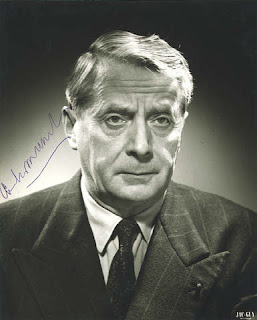Information
Composer: Arthur Honegger; Henri Dutilleux
- Honegger - Symphony No. 4 "Deliciae Basiliensis", H191: 1. Lento e misterioso - Allegro
- Honegger - Symphony No. 4 "Deliciae Basiliensis", H191: 2. Larghetto
- Honegger - Symphony No. 4 "Deliciae Basiliensis", H191: 3. Allegro
- Dutilleux - Metaboles: Incantatoire
- Dutilleux - Metaboles: Lineaire
- Dutilleux - Metaboles: Obsessionel
- Dutilleux - Metaboles: Torpide
- Dutilleux - Metaboles: Flamboyant
Orchestre National de l'ORTF
Charles Münch, conductor
Date: 1967
Label: APEX (original recorded for Erato)
-------------------------------------------------------------------
Review
Charles Münch conducted the first performance of Dutilleux’s Second Symphony in December 1959 with the Boston Symphony Orchestra who had commissioned the work. Münch considered that his life’s mission was to champion new music. He remakred that: "the music of our century is an expression of the preoccupations, anxieties and trends of the world we live in and we ought to listen to it ... and become acquainted with new harmonies and forms." He valued the colourful and kaleidoscopic music of Dutilleux highly. From this reviewer’s point of view, his music is very approachable, there is always something to interest and hold my ear.
In his Second Symphony, Dutilleux divides the orchestra into two unequal groups to experiment with sonorities and their spatial distribution, in something of a game of mirrors. The music constantly shifts in focus and substance, moods changing constantly and spontaneously, at once gloomy, then bright, then classical then grotesquely cartoon-like, then jazz-inflected and, in the third movement, remote and celestial. You sense parodies of the styles of Richard Strauss and over-blown late Romanticism in general, of Bernard Herrmann, of George Gershwin, and of Stravinsky to name but a few.
Dutilleux’sMétabolesis a kind of concerto for orchestra in which a different section of instruments comes under the spotlight in each section. There are five movements ‘Incantatoire’, ‘Linéaire’, ‘Obsessionnel’ ‘Torpide’ and ‘Flamboyant’, each title giving a clue as to the general mood. ‘Torpide’ for instance with its brushed cymbal strokes, languid brass and ascending chattering woodwinds suggesting swarms of insects, might be a sultry portrait of the tropics.
Honegger’s Second and Third Symphonies had been premiered by Münch but he did not feel much drawn to the Fourth. This more serene Symphony with the Latin subtitle "Deliciae basilienses" (The Delights of Basel) was commissioned for the 20thanniversary of the foundation of Paul Sacher’s Basel Chamber Orchestra. It is a fitting companion to the Dutilleux works in this compilation. Again the textures and colours hold the ear. There is something oriental about the work as well as French-pastoral atmospheric - snatches of birdsong and vigorous folksong - plus Swiss melody associated with the city of Basel. The skilfully crafted orchestral texture is extremely transparent and the polyphony joyous.
Fine committed performances of very approachable modern music. The Dutilleux especially is very colourful, kaleidoscopic and quite addictive.
-- Ian Lace, MusicWeb International
-------------------------------------------------------------------
Arthur Honegger (10 March 1892 – 27 November 1955) was a Swiss composer, who was born in France and lived a large part of his life in Paris. He was a member of Les Six, but his style is weightier and more solemn than that of his colleagues. His most frequently performed work is probably the orchestral work Pacific 231, which was inspired by the sound of a steam locomotive. The principal elements of Honegger's style are: Bachian counterpoint, driving rhythms, melodic amplitude, highly coloristic harmonies, an impressionistic use of orchestral sonorities, and a concern for formal architecture.
http://en.wikipedia.org/wiki/Arthur_Honegger
http://en.wikipedia.org/wiki/Arthur_Honegger
***
Henri Dutilleux (2 January 1916 – 22 May 2013) was a French composer active mainly in the second half of the 20th century. His work, which garnered international acclaim, followed in the tradition of Maurice Ravel, Claude Debussy, and Albert Roussel, but in an idiosyncratic style. Some of his notable compositions include a piano sonata, two symphonies, a cello concerto, a violin concerto and a string quartet. Some of these are regarded as masterpieces of 20th-century classical music. A perfectionist with a strong sense of artistic integrity, he allowed only a small number of his works to be published and often repeatedly revised them.
***
Charles Munch (born Charles Münch; 26 September 1891 – 6 November 1968) was an Alsacian symphonic conductor and violinist. He studied with Carl Flesch in Berlin and Lucien Capet at the Conservatoire de Paris, and served as concertmaster of the Leipzig Gewandhausorchester under Wilhelm Furtwängler and Bruno Walter. Noted for his mastery of the French orchestral repertoire, he was best known as music director of the Boston Symphony Orchestra. Munch's discography is extensive, both in Boston on RCA Victor and at his various European posts and guest conducting assignments on various labels, including English Decca, EMI, Nonesuch, Erato and Auvidis-Valois.
http://en.wikipedia.org/wiki/Charles_Munch_(conductor)
http://en.wikipedia.org/wiki/Charles_Munch_(conductor)
-------------------------------------------------------------------
FLAC, tracks
Links in comment
Enjoy!





This comment has been removed by the author.
ReplyDeleteMany thanks
ReplyDeleteCopy Adfly (adf.ly/XXXXXX) or LinkShrink (linkshrink.net/XXXXXX) to your browser's address bar, wait 5 seconds, then click on 'Skip [This] Ad' (or 'Continue') (yellow button, top right).
ReplyDeleteIf Adfly or LinkShrink ask you to download anything, IGNORE them, only download from file hosting site (mega.nz).
If you encounter 'Bandwidth Limit Exceeded' problem, try to create a free account on MEGA.
MEGA
http://adf.ly/1cI7KS